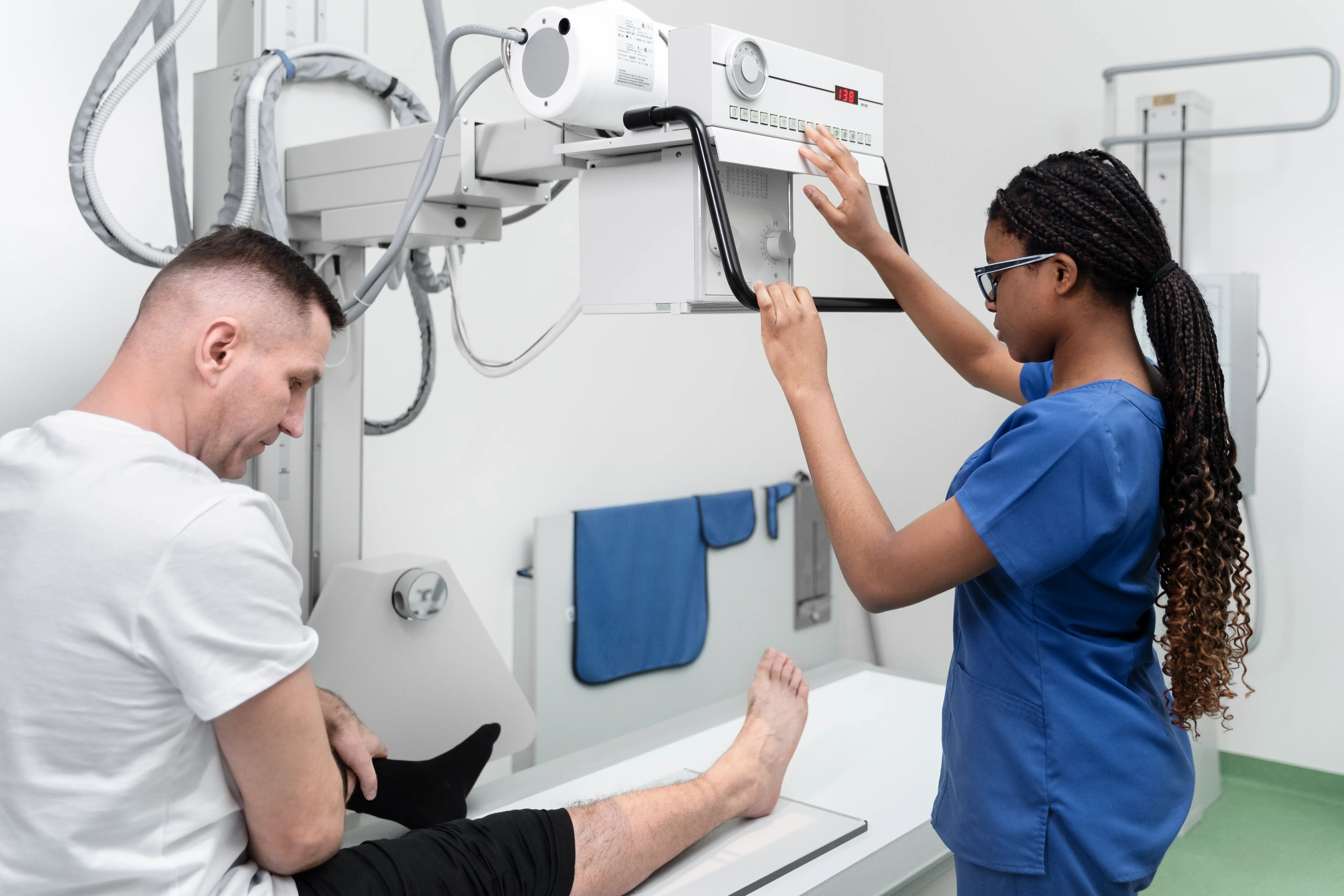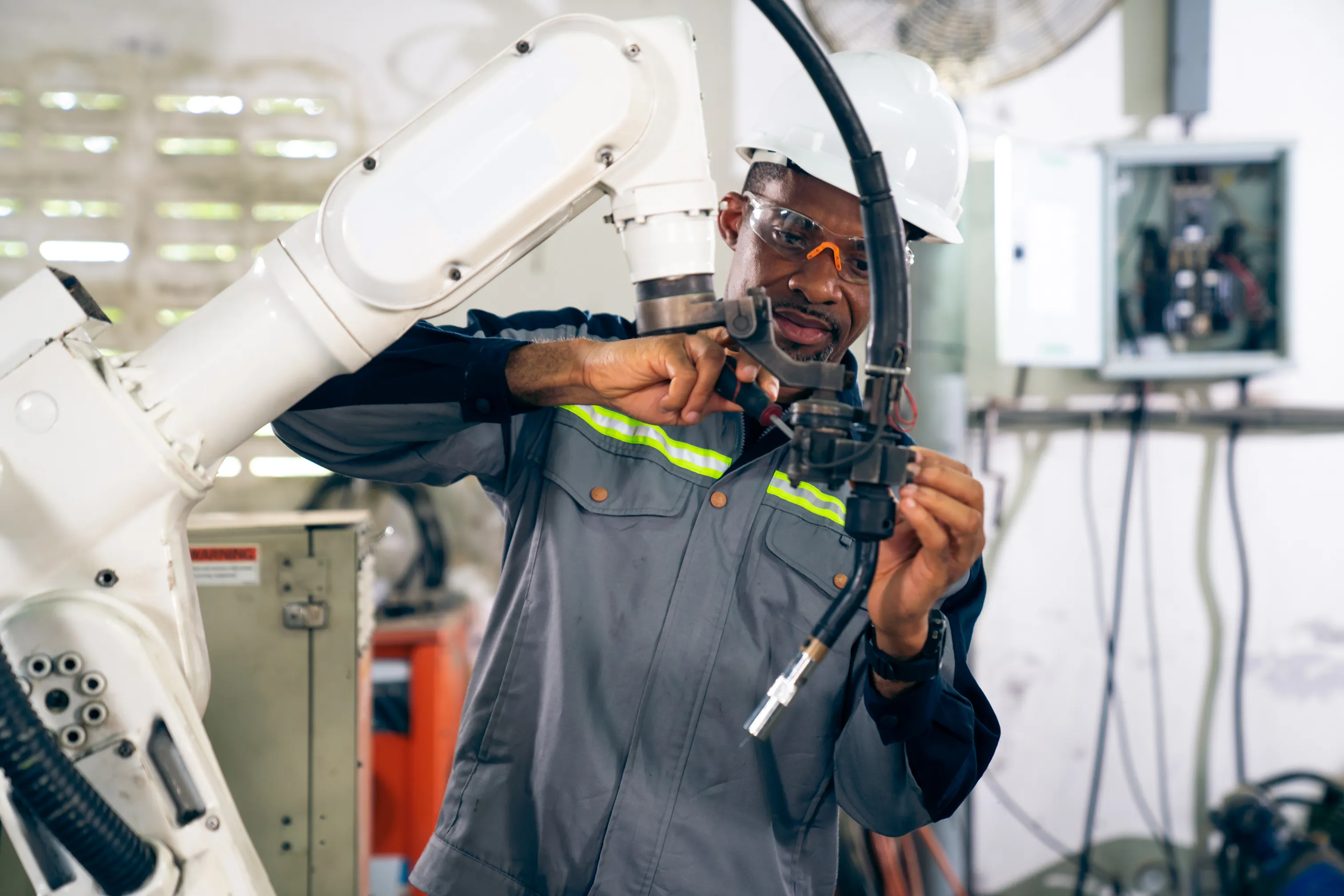Top Paying Trade Jobs in 2025
Let’s break down the highest-paying trade jobs in 2025 that don’t require a college degree.

Maintenance Technician
A maintenance technician is a skilled professional responsible for the installation, upkeep, and repair of facilities, equipment, and systems across residential, commercial, and industrial settings.
They perform routine maintenance, troubleshoot issues, and make necessary repairs to optimize the productivity and efficiency of complex systems while preventing downtime.
Maintenance technicians are currently in high demand across multiple industries, from aviation and healthcare to facilities management and renewable energy.
Annual Salary: Maintenance technicians make an average annual salary of over $55,000. Entry-level positions start at $39,618 per year while experienced workers can make up to $76,540.
Why it Pays Well: Because of the essential role these professionals play in maintaining critical infrastructure and equipment and the cross-disciplinary expertise in mechanics, electronics, and computer systems it requires.
Requirements: A high school diploma or equivalent. Some employers may prefer post-secondary qualifications, such as an associate's degree or vocational certificate in a related field. Additional training, certifications, and on-the-job experience can enhance job prospects and career advancement.
Unmudl offers flexible online courses that make you job-ready as a maintenance technician in mechatronics in as short as 10 weeks.
Job Growth Outlook: The BLS projects a 15% growth in the employment of machinery maintenance workers between 2023 and 2033, which is much faster than the average for all other occupations. It translates to 80,400 new jobs per year over the decade.
Biomedical Equipment Technician
Biomedical equipment technicians calibrate, repair, and maintain vital medical equipment such as MRI machines, ventilators, and other treatment and diagnostic devices in the healthcare industry.
They work across hospitals, clinics, laboratories, and research institutes, where they conduct preventive maintenance, troubleshoot malfunctions, and ensure compliance with relevant safety regulations and standards.
Biomedical equipment technicians are also responsible for training healthcare staff on equipment use.
Annual Salary: These professionals earn an average annual salary of $72,902. Entry-level positions pay $52,356 annually, while technicians with advanced training and experience command salaries as high as $101,511 per annum.
Why it Pays Well: Due to the critical nature of the role in patient care and the increasing healthcare requirements of an aging population.
Requirements: An associate degree in biomedical equipment technology is typically required, though some employers hire candidates with a high school diploma and provide on-the-job training. Accredited online certificate programs with virtual labs lead to faster employment opportunities.
Job Growth Outlook: At 18%, BLS projects a much faster than average annual job growth for biomedical equipment techs from 2023 to 2033. That translates to 7,300 new jobs each year over the given period.

Air Compressor Technician
These professionals are responsible for installing, maintaining, diagnosing, and repairing air compressors and their associated systems.
They diagnose mechanical and electrical issues, perform preventive maintenance, replace parts, and ensure systems meet operational standards.
Air compressor technicians help minimize downtime and maximize productivity across industrial, commercial, and residential settings.
They are crucial in several industries, from manufacturing and construction to automotive and healthcare.
Annual Salary: The average annual salary of an air compressor technician stands at $63,428, and ranges from $32,500 at the low end to $75,000 at the higher end.
Why it Pays Well: Due to the essential role of compressed air systems in critical industrial operations, where downtime is costly. These technicians are highly valued due to their technical expertise in pneumatics and electrical systems.
Requirements: A high school diploma is often the minimum requirement, with most technicians completing a certificate program or associate degree. Apprenticeships and on-the-job training are standard.
Job Growth Outlook: BLS clubs air compressor technicians with industrial machinery mechanics, maintenance machinery workers, and millwrights. Job growth for these professionals is projected to grow annually by 15% from 2023 to 2033, which means 80,400 new jobs every year over the decade.
Elevator and Escalator Installer/Repairer
These professionals install, maintain, troubleshoot, and repair elevators, escalators, moving walkways, and similar equipment. Their work covers residential, commercial, industrial, and public spaces.
The job calls for a solid understanding of mechanical, electrical, and hydraulic principles, besides the ability to interpret schematics, blueprints, and structural drawings.
Elevator and escalator installers and repairers must also ensure all systems meet strict safety and regulatory standards.
Annual Salary: These professionals make an annual median salary of $106,580 per year, making it one of the best-paying trade jobs that don’t require a college degree.
Why it Pays Well: The specialized nature of the work and the need for precision and safety drives high salaries. Urban areas with high-rise buildings have a consistently strong demand for professionals in this trade.
Requirements: A high school diploma or equivalent is typically the minimum educational qualification required, followed by a four-year paid apprenticeship that combines on-the-job training with classroom instruction.
Some states require licensing or certification.
Job Growth Outlook: The BLS projects a 6% growth in the employment of elevator and escalator installers and repairers between 2023 and 2033. That translates to 1,400 new jobs every year over the decade.
Radiation Therapist
Radiation therapists are responsible for administering life-saving treatments for people with serious medical conditions like cancer. They operate specialized biomedical equipment that delivers targeted radiation treatments to patients.
The job involves close coordination with cancer specialists and other healthcare professionals to implement treatment plans accurately, ensure correct dosages, and minimize harm to healthy tissue. Radiation therapists must also provide information to patients and their families about the treatment process, potential side effects, and how to manage them.
Annual Salary: Radiation therapists earn an average annual salary of $135,454. Entry-level salaries start at over $103,000, while top earners make in excess of $177,000 yearly.
Why it Pays Well: Working with critically ill patients is a complex job that requires technical expertise, anatomical knowledge, and emotional resilience. The rise in demand for radiation therapists is in keeping with the healthcare sector’s robust growth.
Requirements: A two-year associate degree in radiation therapy is typically mandatory, along with state-specific licensing and certification from institutions like the American Registry of Radiologic Technologists (ARRT).
Job Growth Outlook: The BLS estimates employment to grow by 3% annually over the decade from 2023 to 2033, which is as fast as the average for all occupations. That means 500 new jobs each year over the given period.

Powerline Installers and Repairers
Powerline installers and repairers are skilled professionals responsible for the construction, maintenance, and repair of electrical transmission and distribution systems that deliver power to homes, businesses, and industries.
They work in high-voltage environments to keep overhead and underground power lines, transformers, and other utility equipment running. These professionals have to be comfortable using climbing gear and working on poles and towers at great heights. They use specialized equipment like bucket trucks, splicers, and measuring devices to maintain and repair powerlines in urban, rural, and remote locations.
Strict compliance with high-voltage electrical safety standards and procedures is a huge part of this job.
Annual Salary: Powerline installers and repairers earn an average annual salary of $85,420. Entry-level salaries start at $45,000 per annum while those with extensive experience and specialization can take home close to $120,000 each year.
Why it Pays Well: The job attracts premium pay because it involves hazardous and potentially life-threatening conditions. That includes working with high voltages, at great heights, and in extreme weather.
Requirements: A high school diploma or equivalent and on-the-job training or a one to two-year apprenticeship are standard requirements. Some attend technical school for additional credentials and certifications to enhance career advancement.
Job Growth Outlook: The stability of the energy sector ensures consistent demand for these professionals. The BLS estimates an 8% job growth for these professionals from 2023 to 2033, which translates to 9,400 new jobs every year over the period.
Aircraft and Avionics Equipment Technician
Aircraft technicians, also known as aircraft mechanics, are responsible for maintaining the mechanical and structural integrity of an aircraft.
That includes engines, flight controls, hydraulics, airframe, landing gear, and brakes. Avionics equipment technicians, on the other hand, install, calibrate, maintain, and repair an aircraft’s complex electronic systems.
That includes sensors and instruments, communication and navigation equipment, collision avoidance systems, and radar devices. Aircraft and avionics equipment technicians must ensure strict compliance with Federal Aviation Administration (FAA) standards.
Both professionals are integral to the smooth, reliable, and safe operation of modern aircraft - from single-seater propeller planes to the latest generation of commercial jets that can seat upwards of 850 passengers.
Annual Salary: Aircraft and avionics equipment technicians earn an average annual salary of $66,721. Starting salaries stand at $34,500, while those with advanced skills and experience make up to $92,000 per annum.
Why it Pays Well: The aviation industry’s high safety standards and complex technology demand workers with specialized skills and multi-disciplinary knowledge, leading to strong compensation.
Requirements: Most aircraft and avionics equipment technicians enter the workforce after completing an 18 to 24-month FAA-approved technical school program. Others enter the field with a high school diploma and FAA-certified on-the-job training.
Job Growth Outlook: The BLS projects a 5% growth in the employment of aircraft and avionics equipment technicians from 2023 to 2033. That equals 8,900 new jobs every year over that period.

Dental Hygienist
A dental hygienist is a licensed healthcare professional who focuses on the prevention and treatment of oral health issues, primarily through teeth cleaning and other non-invasive or cosmetic procedures.
They offer comprehensive oral health services that cover both teeth and gums, including monitoring, treatment, and preventive care.
That includes removing plaque and tartar buildup on teeth and treating gum diseases like gingivitis. Dental hygienists can work independently or in collaboration with dentists to help patients maintain good oral health.
Annual Salary: Dental hygienists make an average of $117,772 annually. Those new to the profession can earn $80,657 per year, while more experienced professionals can take home as much as $144,003.
Why it Pays Well: Due to a combination of high demand, a manageable education path, and specialization opportunities. A dental hygienist’s earning potential is further enhanced with specialization in areas like pediatric dental hygiene or cosmetic dentistry.
Requirements: A two to three-year associate’s degree in dental hygiene from an accredited institution. Candidates must pass the National Board Dental Hygiene Examination (NBDHE) and applicable state or regional clinical licensure exams to be licensed.
Job Growth Outlook: The employment of dental hygienists is projected to grow annually by 9% between 2023 and 2033, per the BLS. That translates to 19,600 new professionals entering the workforce each year over the decade.
Robotics Equipment Technician
This specialized line of work involves the building, installation, maintenance, troubleshooting, and repair of complex robotic systems used in manufacturing, logistics, and a host of other automated industries.
They work with engineers and designers to assemble and test robotic systems, develop control programs, and ensure their optimal functionality. Robotics equipment technicians perform routine inspections, diagnose mechanical or electrical issues, and replace faulty components. They use diagnostic tools, interpret schematics, and program and calibrate systems to meet production needs.
Annual Salary: Robotics equipment technicians make an average of $58,744 per year. Those just entering the field start with an annual salary of $32,000, while their more experienced counterparts can expect to take home $94,500 each year.
Why it Pays Well: It comes down to a combination of factors that include advanced knowledge and skills and high demand driven by the increasing use of robotics and automation across diverse industries.
Requirements: A high school diploma or equivalent, followed by an associate’s degree or certificate in robotics maintenance.
Some candidates enter the workforce through vocational programs or trade schools with specialized training in robotics and automation.
Job Growth Outlook: The BLS classifies robotics equipment technicians under the description ‘electro-mechanical and mechatronics technologists and technicians’. About 1,300 new openings are expected in this category each year from 2023 to 2033.
























